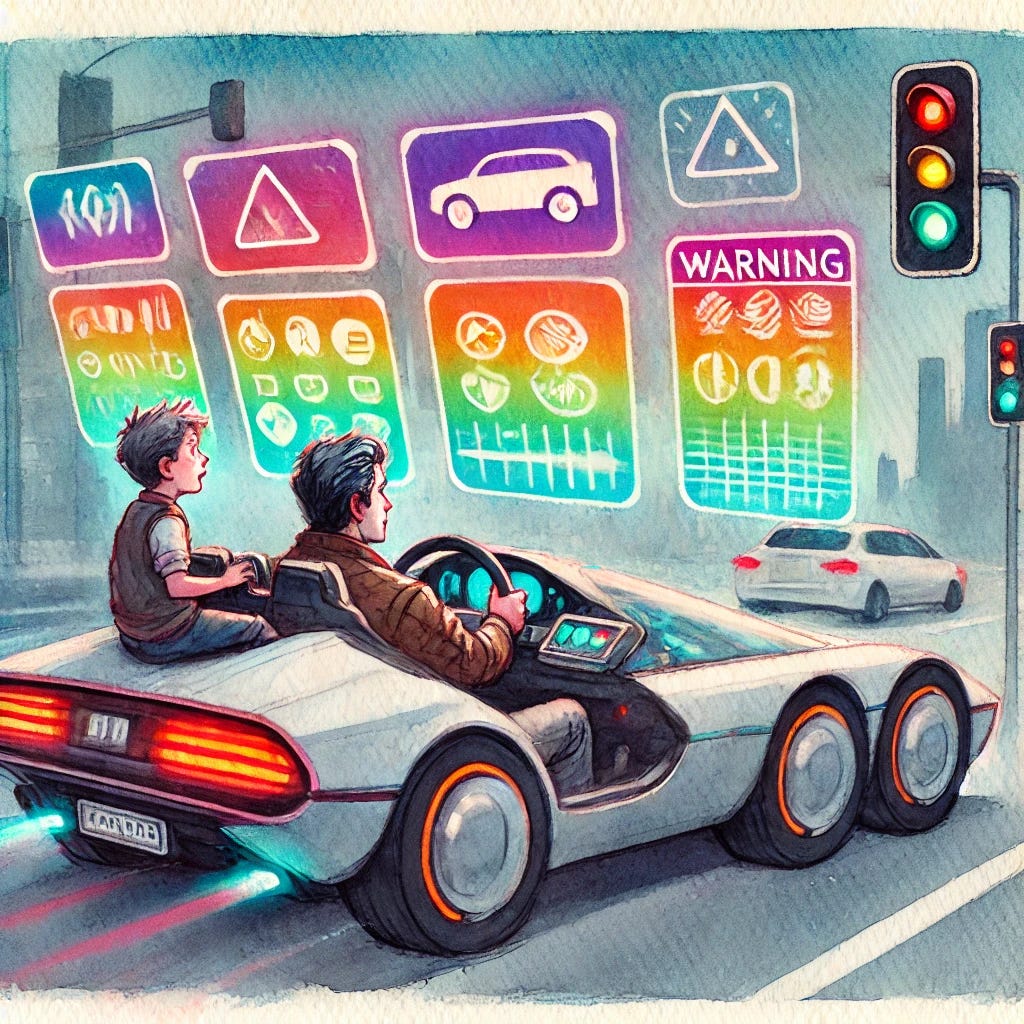The Joy Ride Tax
Driving. 600 words, 3 minute read. With Claude Sonnet.
Every morning, Harold's wrist-mounted health monitor chimed when his coffee contained too much sugar. His smart fridge beeped disapprovingly when he reached for full-fat milk. His shower head flashed red when he exceeded his daily water quota. But today, as he gripped the steering wheel of his grandson Tommy’s sedan for the first time in twenty years, he was determined to silence at least one of modern life's endless digital critiques. Besides, Tommy’s school was only one town over - surely he could manage that.
"Grandpa, your grip strength is elevated," Tommy observed, gesturing at Harold's health monitor without looking up from his holophone. "The car's sensory system is probably going to flag that as driver stress."
The dashboard's holographic display flickered with a gentle warning. Harold's jaw tightened. "Back in my day, a car was just a car. Not a back-seat driver made of silicon and suggestions."
"But that's what makes it better now," Tommy said, his fingers dancing across a game interface that constantly rewarded or penalized each move. "Instant feedback loops. Like this game—see how it helps me optimize my performance? Every action has a corresponding—"
A soft chime interrupted him.
"Fifty-eight in a fifty-five zone," Tommy reported automatically, the same way he announced his game scores. "That's two credits deducted. The system uses micro-penalties to encourage compliance."
Harold watched the credit counter tick down. "Compliance," he repeated, testing the word like a sour candy. "When I learned to drive, you developed instincts. Felt the road. Now everything's just numbers and notifications."
More chimes, a digital percussion pinging on every minor mistake.
"It's actually pretty efficient," Tommy continued, his voice taking on the same tone as his father's during lectures. "The AI analyzes traffic patterns, weather conditions, and road status in real-time to optimize—"
"Optimize?" Harold asked. "Life isn't meant to be optimized, boy. It's meant to be lived. Watch this."
Coming off of a red light, Harold floored it. The credit counter spun like the scoreboard of Tommy's games. Warning messages bloomed across the windshield, each one competing for attention with increasingly urgent suggestions.
"This is incredible!" Tommy was looking up now, his game forgotten. "Your social credit score is dropping in real-time! The car's trying to auto-correct... wait, how did you override that? The neural feedback loop should've..."
As the electric motors smoothly shifted registers as he accelerated, Harold felt something he hadn't in decades: pure, unfiltered freedom. No gentle nudges. No helpful suggestions. No well-meaning algorithms trying to shape his behavior into acceptable patterns.
Just the thrill of making his own choices, consequences be damned.
The sedan's AI began playing soothing music, attempting to modify his mood. The seat adjusted its massage functions to reduce stress. The air conditioning subtly shifted to a calming temperature. Each system deployed its own subtle strategy to guide him back to optimal parameters.
Finally, Harold eased his foot off the accelerator. Not because of the penalties or the warnings or the disapproving chimes, but because he chose to. The car's systems gradually returned to normal, like a collective digital sigh of relief.
"You know what, Tommy?" Harold said, watching the last warning message fade from the windshield, "sometimes the best feedback isn't a chime or a credit score. It's looking over and seeing your grandson's face light up like that."



